- Home
- Carlos Ruiz Zafón
The Prince of Mist
The Prince of Mist Read online
Dear Reader,
The Prince of Mist was the first novel I ever published and it marked the beginning of my career as a writer in 1992. Readers familiar with my later work, such as The Shadow of the Wind or The Angel’s Game, may not know that my first four novels were originally published as ‘young adult’ books. Although they were mainly aimed at young readers my hope was that they would appeal to readers of all ages. In creating those books I tried to write the kind of novels that I would have liked to read as a kid, but that would also continue to interest me at the age of twenty-three, or forty, or eighty-three.
Since their original publication, these earlier works of mine have fortunately been well received by those who are young, and those who are not so young. I like to believe that storytelling transcends age limitations, and I hope readers of my adult novels will be tempted to explore these stories of magic, mystery and adventure. Lastly, to all new readers, I hope you will come to enjoy these novels too as you begin your own adventures in the world of books.
Safe travels,
December 2009
Praise for Carlos Ruiz Zafón
The Prince of Mist
‘The first book from The Shadow of the Wind author – published in English at last – is an atmospheric thriller following a young hero as he explores his new house in the country. Described as a cross between Stephen King and Neil Gaiman, it proves young adult fiction can be as gripping as the adult version’
Times Educational Supplement
‘Everybody’s talking about Carlos Ruiz Zafón, the bestselling author of The Shadow of the Wind, and The Angel’s Game, who returns with The Prince of Mist. This very scary ghost story stayed at the top of the Spanish book charts for two years and is now translated into English for the first time. The haunting tale is aimed at readers of all ages, so is one to share with the whole family’
Good Housekeeping
‘In this page-turner, a young hero finds himself in a house haunted by secrets he is fated to uncover – but at what cost? Magical and, even though I’m a grown-up, SCARY!’ Lauren Laverne, Grazia
‘Addictive page-turner with things that go bump in the night’
Essentials
‘Zafón mixes youthful romance, devilish pacts, salty seadogs, scary clowns and haunted shipwrecks with a generous hand, and you might not want to go diving again after reading this’
Financial Times
The Angel’s Game
‘The prose is intelligent but unpretentious, and the author is clear in his intentions to provide a rollicking, fun read … the novel’s themes address the power of narrative, and many sharp lines pertain to storytelling … hugely enjoyable’
Daily Telegraph
‘In this book about books, Zafón writes about Spain’s harrowing history with literary aplomb’
The Times
‘Another imaginative gothic tale’
Harpers Bazaar
‘Revisits some of Zafón’s much-loved urban landscapes in old Barcelona. Yet this novel stands alone, a complement or even an antagonist to its forerunner. If the previous book celebrated the ecstasies of reading, then this one – no less in love with literature, and no less crammed with archetypal plots – explores the agonies of writing’
Independent
‘Readers familiar with The Shadow of the Wind will find themselves back in the Cemetery of Forgotten Books … rattling good gothic fun’
Spectator
‘Summer and reading go together like buckets and spades, and sultry days are made for chunky page-turners such as The Angel’s Game’
Daily Mail
‘The Cemetery of Forgotten Books – “a colossal labyrinth of bridges, passages and shelves” – is a wonderful creation, and there are many thrilling set pieces’
Sunday Telegraph
‘The Angel’s Game is full of gothic features: darkness, ruined houses, locked rooms, the smell of damp earth and portentous conversations conducted by candlelight’
Times Literary Supplement
‘The tale is rich, evocative and literate, with Great Expectations and Faust among its more nakedly displayed influences. Zafón is a great describer, with a cinematic flair for murders and sexual encounters’
Evening Standard
‘Will grip you from start to finish’
Daily Express
The Shadow of the Wind
‘If you thought the gothic novel died with the nineteenth century, this will change your mind … in Zafón’s hands, every scene seems to come from an early Orson Welles movie … one gorgeous read’
Stephen King
‘The Shadow of the Wind is a triumph of the storyteller’s art. I couldn’t put it down. Enchanting, hilarious and heartbreaking, this book will change your life’
Daily Telegraph
‘Gripping and instantly atmospheric’
Mail on Sunday, You Magazine
‘What makes this novel so irresistibly readable is the emotional energy generated by the ups and downs of a big and varied cast of memorable characters … His conviction of the importance of literature in real life comes shining through’
Guardian
‘Everything about The Shadow of the Wind is smooth. The language purrs along, while the plot twists and unravels with a languid grace … Zafón’s novel is atmospheric, beguiling and thoroughly readable’
Observer
‘One of those rare novels that combine brilliant plotting with sublime writing’
Sunday Times
‘Carlos Ruiz Zafón’s wonderfully chock-a-block novel The Shadow of the Wind starts with the search for a mysterious author in Barcelona in the aftermath of the Civil War and then packs in as many plots and characters as it does genres – Gothic melodrama, coming-of-age story, historical thriller and more. It is a deeply satisfying, rich, full read’
Sunday Telegraph
‘This gripping novel has the feel of a gothic ghost story, complete with crumbling, ivy-covered mansions, gargoyles and dank prison cells … this is just the sort of literary mystery that would have found favour with Wilkie Collins’
Daily Mail
‘Zafón makes sure there’s a robust serving of amor, and enough magic, murder and madness to keep even the most reluctant reader engrossed. Diabolically good’
Elle
Contents
Praise for Carlos Ruiz Zafón
Chapter 1
Chapter 2
Chapter 3
Chapter 4
Chapter 5
Chapter 6
Chapter 7
Chapter 8
Chapter 9
Chapter 10
Chapter 11
Chapter 12
Chapter 13
Chapter 14
Chapter 15
Chapter 16
Chapter 17
Chapter 18
Epilogue
The Prince of Mist
In Brief
About the Author
For Discussion
Suggested Further Reading
The Midnight Palace
The Return Of Darkness
Copyright
1
MAX WOULD NEVER FORGET THAT FARAWAY summer when, almost by chance, he discovered magic. It was 1943 and the winds of war were dragging the world relentlessly towards the abyss. In the middle of June, on Max’s thirteenth birthday, his father, an eccentric watchmaker and inventor of dazzling if completely impractical devices, gathered the family in the living room to announce that this would be their last day in the lofty apartment perched high above the oldest part of the city, a place that had been their home ever since he could remember. A deathly silence fell upon the members of the C
arver family. They looked at each other, and then at the watchmaker. He had that smile on his face they all knew so well, the one that always meant he had bad news or another of his crazy ideas.
‘We are moving,’ he announced, ‘to a beach house in a small town on the coast. We’re getting out of this city and away from the war.’
Max gulped then timidly raised his hand in protest. The other members of the family joined in, but the watchmaker waved away their concerns. He was on a roll now, and he laid out his plan with military precision. There would be no going back on the decision: they were leaving the next morning at dawn. Now they had to pack up their most prized possessions and prepare for the long journey to their new home.
In truth, the family was not entirely surprised by the news. They all suspected that the idea of leaving the city in search of a better place to live had been on Maximilian Carver’s mind for some time; everyone, that is, except his son Max. To him, the news felt like a mad steam train hurtling through a china shop. His mind went blank, his mouth sagged and his eyes glazed over. As he stood, transfixed, it occurred to him that his entire world – his friends at school, everyone he hung about with, even the corner shop where he bought his comics – was about to vanish forever.
While the rest of the family went off to pack up their belongings, finally resigned to their fate, Max remained staring at his father. The watchmaker knelt down and placed his hands gently on his son’s shoulders. The look on Max’s face spoke volumes.
‘It might seem like the end of the world to you now, Max, but I promise you’ll like the place we’re moving to. You’ll make new friends, you’ll see.’
‘Is it because of the war?’ asked Max. ‘Is that why we have to leave?’
A shadow of sadness fell across his father’s eyes. All the drive and conviction of the speech he had made to them earlier was gone, and it occurred to Max that perhaps his father was the one who was most afraid of leaving. If he had pretended to be excited about the move, then it was because it was the best thing for his family. It meant there was no other option.
‘It’s bad, isn’t it?’ Max asked.
‘Things’ll get better. We’ll be back. I promise.’
Maximilian Carver hugged his son and smiled mysteriously, then pulled an object out of his jacket pocket and put it in Max’s hands. It was a shiny oval that hung from a chain. A pocket watch.
‘I made it for you. Happy birthday, Max.’
Max opened the silver watch. The hours on the face were marked out by moons that waxed and waned to the rhythm of time, and the hands were rays of a sun radiating out from the centre of the dial. On the case, engraved in fine script, were the words ‘Max’s time machine’.
For a second Max wished his father’s latest invention really could stop time. Yet, when he raised his eyes and glanced through the window it already seemed to him as if the light of day was receding and the endless city of spires and domes, of chimneys weaving cobwebs of smoke across the iron skies, had started to fade away.
Years later, as he remembered the scene, his family wandering to and fro with their bags while he sat in a corner clutching the watch his father had given him, Max knew that this was the day he left his childhood behind.
*
That night Max didn’t sleep a wink. While the rest of the family slept he lay awake, dreading the dawn when he would have to say goodbye to the small universe he had built for himself over the years. The hours crept by silently as he lay stretched out on his bed, his eyes lost in the blue shadows that danced on the ceiling, as if he might find in them some oracle that could predict his destiny; in his hand, the watch his father had made for him. The moons glowed in the darkness of the night – perhaps they held the answer to all the questions he had begun to ask himself that afternoon.
Finally day began to break over the horizon in a streak of red light. Max jumped out of bed and went down to the living room. His father was sitting in an armchair, fully dressed, reading a book by the light of an oil lamp. Max was not the only one who had spent a sleepless night. The watchmaker smiled at him and closed his book.
‘What are you reading?’ asked Max, pointing at the thick volume.
‘It’s a book about Copernicus. I take it you know who he is?’ asked Mr Carver.
‘I do go to school, you know,’ said Max.
His father sometimes still treated him as if he were a child.
‘Well what do you know about him?’ his father insisted.
‘He discovered that the earth turns around the sun, not the other way round.’
‘Not bad. And do you know what that means?’
‘Problems,’ Max replied.
The watchmaker smiled and handed Max the hefty tome.
‘Here, it’s yours. Read it.’
Max inspected the mysterious leather-bound volume. It looked as if it was a thousand years old and might house the spirit of some age-old genie trapped in its pages by an ancient curse.
‘Well now,’ his father said abruptly, ‘who’s going to wake your sisters?’
Without looking up from the book, Max shook his head to indicate that he was granting his father the honour of dragging his two sisters – Alicia, aged fifteen, and Irina, aged eight – out of their beds.
While Maximilian Carver walked off to give the rest of the family their wake-up call, Max settled into the armchair and began to read. He lost himself in the words and images conjured in his mind and for a while forgot that his family was going anywhere. He found himself flying among stars and planets, but then he looked up and saw his mother standing next to him with tears in her eyes.
‘You and your sisters were born in this house,’ she murmured.
‘We’ll be back,’ he said, echoing his father’s words. ‘You’ll see.’
His mother smiled at him and kissed him on the forehead.
‘As long as you’re with me, I don’t care where we go,’ she said.
His mother had a way of reading his thoughts. Half an hour later, the entire family passed through the front doorway for the last time, heading towards a new life. Summer had begun.
*
Max had once read in one of his father’s books that some childhood images become engraved in the mind like photographs, like scenes you can return to again and again and will always remember, no matter how much time goes by. He understood the meaning of those words the first time he saw the sea. The family had been travelling on the train for over three hours when, all of a sudden, they emerged from a dark tunnel and Max found himself gazing at an endless expanse of ethereal light, the electric blue of the sea shimmering beneath the midday sun, imprinting itself on his retina like a supernatural apparition. The ashen light that perpetually drowned the old city already seemed like a distant memory. He felt as if he had spent his entire life looking at the world through a black and white lens and suddenly it had sprung into life, in full, luminous colour he could almost touch. As the train continued its journey only a few metres from the shore, Max leaned out of the window and, for the first time ever, felt the touch of salty wind on his skin. He turned to look at his father, who was watching him from the other end of the compartment with his mysterious smile, nodding in reply to a question Max hadn’t even asked. At that moment Max promised himself that whatever their destination, whatever the name of the station this train was taking them to, from that day on he would never live anywhere he couldn’t wake up every morning to see that same dazzling blue light that rose towards heaven like some magical essence.
*
While Max stood on the platform watching the train ride away through clouds of steam, Mr Carver left his family standing beside their suitcases outside the stationmaster’s office and went off to negotiate a reasonable price for the transportation of luggage, people and paraphernalia to their final destination. Max’s first impression of the town, judging from the station and the few houses he could see, their roofs peeping timidly over the surrounding trees, was that it looked like one of those minia
ture villages, the sort you got with train sets, where the imaginary inhabitants were in danger of falling off a table if they wandered too far. Max was busy contemplating this variation on Copernicus’s theory of the universe when his mother’s voice wrestled him from his daydream.
‘Well, Max. What’s the veredict?’
‘It’s too soon to tell,’ he answered. ‘It looks like a model, like those ones you see in toy-shop windows.’
‘Maybe it is.’ His mother smiled. When she smiled, Max could see a vague resemblance to his sister Irina.
‘But don’t tell your father,’ she went on. ‘Here he comes now.’
Maximilian Carver was escorted by two burly porters whose clothes were splattered with grease stains, soot and other unidentifiable substances. Each had a thick moustache and wore a sailor’s cap, as if this was their uniform.
‘This is Robin and Philip,’ the watchmaker explained. ‘Robin will take the luggage and Philip will take us. Is that all right?’
Max wasn’t clear which one was Philip and which one was Robin, and he wondered if they could even tell themselves, but he chose to keep his mouth shut. Without waiting for the family’s approval, the two men walked over to the mountain of trunks and hoisted up the largest one as if it weighed nothing. Max pulled out his watch and looked at the face with its curving moons. It was two o’clock. The old station clock said half past twelve.
‘The station clock is slow,’ muttered Max.
‘You see?’ his father replied excitedly. ‘We’ve only just arrived and already there’s work here for us.’
His mother gave a faint smile, as she always did when Maximilian Carver had one of his bursts of radiant optimism, but Max could see a hint of sadness in her eyes, that peculiar light which, ever since he was a child, had led him to believe that his mother could foresee events in the future that the rest of them would not even dream of.
‘Everything’s going to be all right, Mum,’ he said, feeling like an idiot the moment he’d spoken.
His mother stroked his cheek.
‘Of course, Max. Everything’s going to be fine.’

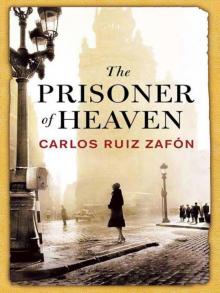 The Prisoner of Heaven
The Prisoner of Heaven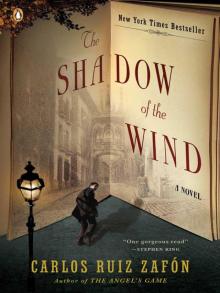 The Shadow of the Wind
The Shadow of the Wind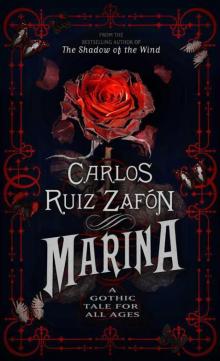 Marina
Marina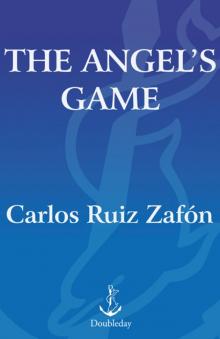 The Angel's Game
The Angel's Game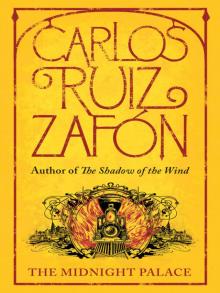 The Midnight Palace
The Midnight Palace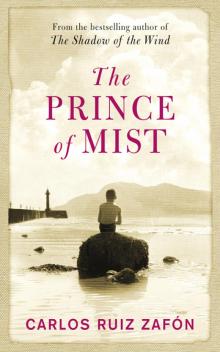 The Prince of Mist
The Prince of Mist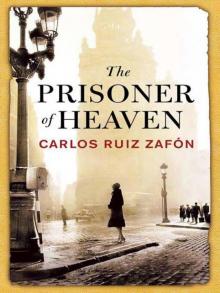 The Prisoner of Heaven: A Novel
The Prisoner of Heaven: A Novel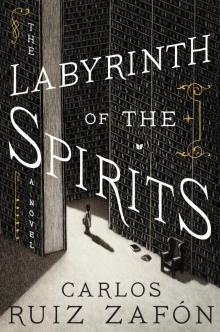 The Labyrinth of the Spirits
The Labyrinth of the Spirits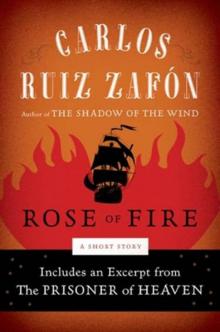 Rose of Fire
Rose of Fire